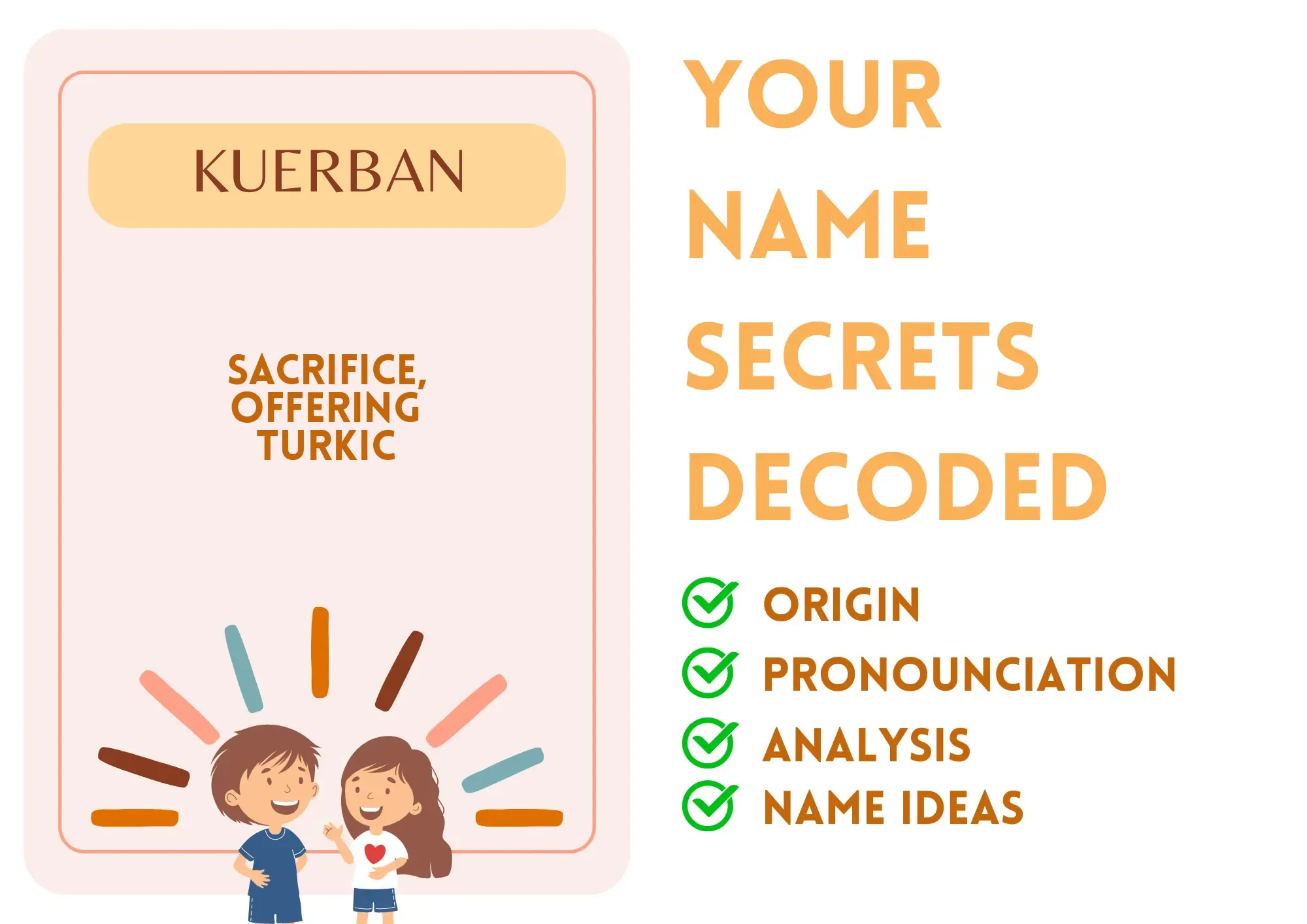
Kuerban
Kuerban is a name of Turkic origin, translating to ‘sacrifice’ or ‘offering’ in many Turkic languages. It is commonly used in Central Asian cultures, particularly among ethnic groups such as the Uighurs and Kazakhs. The name carries a strong religious and cultural significance, often associated with Islamic traditions where the act of sacrifice holds deep spiritual meaning.
Kuerban is viewed positively, connoting selflessness and devotion. It is easy to write and pronounce, making it accessible in various linguistic contexts. Despite this, some might struggle with the spelling or pronunciation due to its unique sound structure.
Historically, Kuerban is linked to the celebration of Eid al-Adha, a significant event in Islamic culture that commemorates the willingness of Ibrahim (Abraham) to sacrifice his son as an act of obedience to God. This act of giving reflects the profound values of charity and faith.
Basic Information
Gender: Unisex
Sounds Like: koo-er-bahn
Pronunciation Explanation: The name is pronounced with the emphasis on the first syllable 'koo,' followed by 'er,' and ending with 'bahn.'
Summary and Meaning
Meaning: sacrifice, offering (Turkic)
Origin: Kuerban has Turkic roots, often found among Turkic-speaking peoples and Islamic cultures.
Usage: Kuerban is unisex, suitable for both males and females, though it may be used more traditionally for males.
Name Number (Chaldean)
Name Number (Pythagorean)
Popularity (Global Rank)
Overall: 1327923
Boys: 72681
Girls:
Most Popular in
Religious and Cultural Significance
Religion: Islam
Background: In Islamic culture, Kuerban is associated with the concept of sacrifice, especially during Eid al-Adha, highlighting themes of devotion and community.
Cultural Significance: The name Kuerban is significant due to its ties to religious practices and the cultural importance of sacrifice, inspiring reverence among those who identify with these traditions.
Historical Significance: Kuerban holds historical relevance, particularly during Islamic festivities where communal sacrifices reflect unity and compassion within communities.
Popular Culture
Literature and Mythology: While not widely featured in mainstream global literature, Kuerban can appear in ethnic poetry or stories focused on themes of sacrifice.
Movies and Television: Characters named Kuerban may occasionally reflect inherent themes of selflessness; however, it is less common in mainstream films.
Feelings and Perceptions
Perception: Kuerban is perceived positively among those familiar with its meaning, often associated with strength, spirituality, and familial bonds.
Positive Feelings: Noble, devotional, selfless, culturally rich, significant.
Negative Feelings: May be considered difficult to pronounce or too complex by those unfamiliar with Turkic languages.
Practical Considerations
Ease of Writing and Calling: Kuerban is straightforward to pronounce, comprising three syllables. However, its unique spelling may occasionally confuse those not familiar with the name.
Common Typos and Misspellings: Kurban,Kuerbaan,Kuerbanne,Kurbaaan
Common Nicknames: Kuer,Kubu,Kerry
Kuerban Popularity
Kuerban Usage and Popularity By Country
| Country | Rank (Overall) |
|---|---|
| Sweden | 31840 |
| United States | 539518 |
Kuerban Usage and Popularity By City
| City | Rank (Overall) |
|---|
Compatibility Analysis
Famous Persons Named Kuerban
No results found for Kuerban.
Related Names
Similar Sounding Names:
Kuban,Korben,Kiran